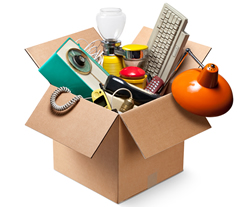Emma Wynne* and Nadia Mitsopoulos* say several new community initiatives in Perth are challenging our throwaway culture and have saved millions of items from going to landfill.

Photo: malerapaso
A number of initiatives in Perth are challenging our throwaway culture by encouraging community giving, repairing and more thoughtful buying.
David Klein founded Perth’s first Buy Nothing group in early 2016 as a way to solve a few problems after moving house, but it has become so much more.
“I had just moved, got rid of some things, needed some things, didn’t know any of my neighbours yet, and that was right around the time I heard about the international Buy Nothing project,” Mr Klein said.
He set up a Facebook group for people in his suburb to offer things they no longer wanted free to people in the area.
The idea took off and there are now 110 groups with 55,000 members throughout Western Australia.
Residents have since offered everything from cars and pianos to small glass jars.
“You become more woven into your community through the exchanges you have with your neighbours,” Mr Klein told ABC Radio Perth.
Millions of things given away
He estimates the WA groups have saved millions of items from going to landfill.
“Last time I calculated it, our group had given away about 25,000 items,” he said.
“Talking to another group, they were averaging 250 items a day — that is 70,000 a year.”
“I think you could conservatively say that 2 million items have been saved from landfill, and it could be as high as 5 million.”
It was not part of the plan, but being part of the Buy Nothing movement has changed Mr Klein’s attitude to stuff, even when it’s free.
“When there is an endless amount of free stuff to be had, you have to ask yourself a little more deeply: do I really want this thing?”
“And your mind tends to shift to being a little less consumerist and think: ‘What are the things that I am cluttering up my life with, cluttering up my house with?’”
Australians buying and throwing away more
Julie Leslie is a sustainable fashion blogger who also wants people to stop and think before they consume in a bid to curb what she said were “ridiculous statistics” around textile waste.
“We are buying about 60 per cent more than we were 15 years ago and we are keeping it for half as long,” she said.
“On average, Australian women are wearing their garments an average of four to seven times before throwing them out.”
Part of the problem, she said, was that people were buying cheap, poorly made clothes that were not built to last, could not be mended or resold in op shops and therefore ended up in landfill.
“There is no conscious consumerism with fast fashion unfortunately,” Ms Leslie said.
“It’s just churn and burn and chuck it out and move on to the next thing faster than you can blink.”
Op shop challenge
In 2016 Ms Leslie challenged herself to only buy clothes from op shops or second-hand stores for a year.
“I still found exceptional quality clothes,” she said of the experiment, which has now turned into a permanent life shift.
“It was a real learning curve for me, but I now have a great wardrobe put together on a thrifty budget and one I am completely happy with.”
“That to me is a sustainable wardrobe; one you love, take care of and repair.”
The cost of repairs
Many ABC Radio Perth listeners expressed frustration that many household goods were difficult or expensive to repair and that it was cheaper to throw them away.
Elle Gonzalez-Skuja is hoping the repair cafe she founded in the Perth suburb of Mt Hawthorn might help.
Once a month people are offered the opportunity to bring in things for repair with help from skilled volunteers.
“We repair bikes, small items of furniture, clothing, electrical, toys, jewellery,” Ms Gonzalez-Skuja said.
“Waste is diverted from landfill, people learn new skills and then carbon dioxide emissions are reduced.”
Since the service launched six months ago, it has had a high success rate.
They can also advise people where to get more complex repairs done if needed.
Ultimately, Ms Leslie thinks we all need to buy less and love the things we do buy enough to look after them.
“I think we have lost touch with where our things came from — who made them, who grew them, who sewed them,” she said.
“If you know the stories behind your things you are likely to value them more.”
* Emma Wynne is the cross-media reporter at ABC Radio Perth. She tweets at @em_wynne.
Nadia Mitsopoulos is a producer with the Morning program on 720 ABC Perth.
This article first appeared at www.abc.net.au.





